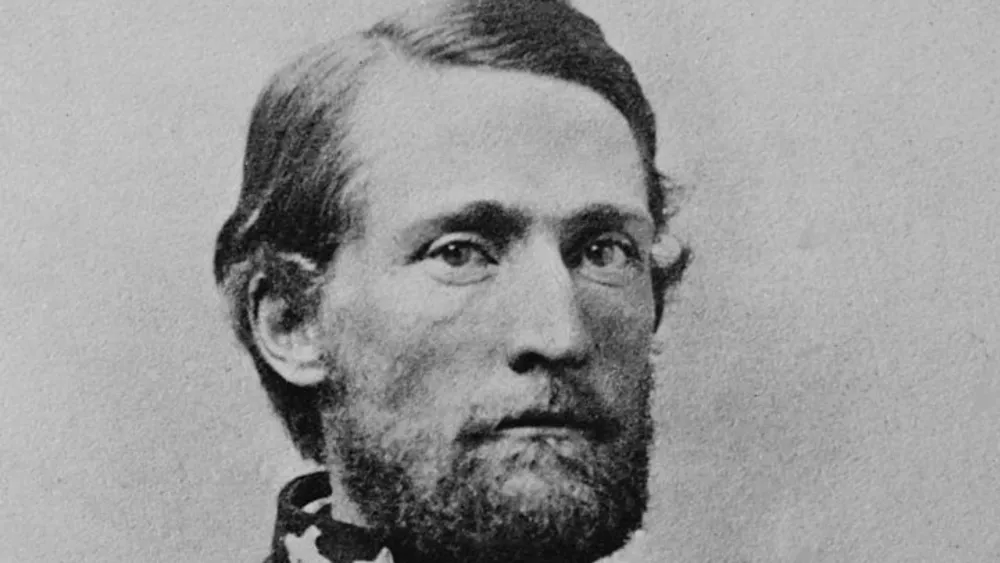John S Mosby, also called the “Gray Ghost,” was a soldier in the American Civil War. He led a group of cavalry called Mosby’s Rangers, known for their quick attacks and ability to escape from the Union Army. They were really good at blending in with local people and disappearing. The area in Virginia where Mosby operated became known as Mosby’s Confederacy.
After the war, Mosby became a Republican and worked as a lawyer. Surprisingly, he supported the president, who was once his enemy, Ulysses S. Grant. Mosby also had jobs as the American consul in Hong Kong and in the U.S. Department of Justice.
Early Life in Virginia: A Glimpse into Mosby’s Roots
John S Mosby, born on December 6, 1833, in Powhatan County, Virginia, came from a family with deep roots in the state. His parents were Virginia McLaurine Mosby and Alfred Daniel Mosby, a graduate of Hampden–Sydney College.
The Mosby family traced its origins back to England, with Richard Mosby settling in Charles City, Virginia, in the early 17th century.
Mosby’s early education began at Murrell’s Shop in Elma, Nelson County. However, when his family moved to Albemarle County, Virginia, around 1840, he attended school in Fry’s Woods. Afterwards, he transferred to a Charlottesville school at the age of ten.
Despite his small stature and frail health, Mosby faced bullying throughout his school years. Instead of letting it defeat him, he chose to stand up for himself. Moreover, he displayed resilience and determination. In his memoirs, Mosby mentioned that he never actually won a fight. Yet, he never lost when an adult intervened and stopped the conflict.
These early experiences reflect Mosby’s tenacity and refusal to be pushed around. Therefore, it set the stage for the courageous and determined leader he would become during the Civil War.
New Beginnings in Classical Studies
In 1847, Mosby began his studies at Hampden–Sydney College, where his father had also attended. However, he had trouble with his math class and had to leave the college after two years. Then, on October 3, 1850, Mosby enrolled at the University of Virginia. Here, he focused on Classical Studies and became a member of the Washington Literary Society and Debating Union. While he excelled in subjects like Latin, Greek, and literature that he enjoyed, math continued to be a challenge.
In his third year at the university, Mosby got into a disagreement with a notorious bully named George R. Turpin. Turpin was a strong and imposing figure who insulted Mosby, prompting Mosby to follow the code of honor adhered to by Southern gentlemen. According to this code, Mosby sent Turpin a letter seeking an explanation. However, Turpin didn’t resolve the issue and instead became angry, threatening physical harm to Mosby in their next encounter. Despite the potential risks, Mosby chose to face Turpin rather than run away, as running away would be considered dishonorable according to the code he followed.
John S Mosby: Building Bridges Behind Bars
While Mosby was serving time, something remarkable happened. He managed to befriend his prosecutor, a lawyer named William J. Robertson. When Mosby mentioned his interest in studying law, Robertson generously offered him access to his law library. This provided Mosby with an opportunity to dive into the study of law during the rest of his time in jail.
Despite the challenges, Mosby’s friends and family worked hard to use their political connections to get him a pardon. Fortunately, Governor Joseph Johnson carefully reviewed the evidence and decided to pardon Mosby on December 23, 1853. Mosby received it like a Christmas present. Furthermore, the state legislature annulled the $500 fine imposed on him during its next session.
The whole incident, the trial, and the time spent in prison deeply affected Mosby. Interestingly, he never wrote about this difficult period in his memoirs, suggesting how much it had impacted him emotionally.
After spending months studying law in Robertson’s law office, Mosby achieved a significant milestone. He was officially admitted to the bar, a kind of legal certification, and he went on to establish his own law practice in the nearby town of Howardsville. This turn of events marked a new chapter in Mosby’s life, highlighting his resilience and determination to overcome challenges and pursue his passion for the law.
The Wedding Bells: John S Mosby and Pauline’s Union in Nashville
Around this time, Mosby’s life took a significant turn as he met Pauline Clarke, who was visiting from Kentucky. Despite their differences in religious beliefs—Mosby was Protestant, leaning towards Methodism or agnosticism, while Pauline was Catholic—they entered into a courtship. Pauline’s father was Beverly L. Clarke, and they got married in a Nashville hotel on December 30, 1857. After spending a year with Mosby’s parents, the couple settled in Bristol, Virginia, close to a road connecting Tennessee and Kentucky through the Cumberland Gap.
Mosby’s Dedication to His Family’s Learning
Before the Civil War, the Mosbys had two children, May and Beverley. During the war, John Singleton Mosby Jr. was born in 1863 and later followed in his father’s footsteps, becoming a lawyer and working for mining companies in the West. By 1870, the family grew to include five children, with the addition of Lincoln Mosby (1865–1923) and Victoria Stuart Mosby Coleman (1866–1946). They lived in Warrenton, Virginia, where the Catholic Church established a mission by 1874, now known as St. John the Evangelist Catholic Church.
Mosby loved his family a lot and made sure they got the best education at Catholic schools in Washington, D.C. This happened after he moved there when his wife passed away in 1876. Even after this tragedy, Mosby continued to support his family, and his sons served as altar boys. His youngest sister, Florie, not only converted to Catholicism but also became a Catholic nun.
John S Mosby: Impact of the 1862 Act during the Civil War
During the American Civil War, Mosby initially opposed secession but joined the Confederate army as a private. He served in William “Grumble” Jones’s Washington Mounted Rifles, later discontent with the collective “Virginia Volunteers.” In 1862, the Partisan Ranger Act granted Mosby the same benefits as regular soldiers. Captured in July, he spied on Union activities even in prison, providing crucial information to Robert E. Lee. Post-Battle of Fredericksburg, Mosby, and J.E.B. Stuart led raids disrupting Union communications, marking the birth of Mosby’s Rangers in Loudoun County, Virginia.

Acknowledging Patriotism in Later Years
In his later years, at age 76, Mosby was compelled to retire from his Justice Department role under President William Howard Taft. Despite being blind in one eye and having a cantankerous demeanor, he spent his final days in Washington, D.C., residing in a boardinghouse, watched over by his remaining daughters. Mosby continued writing about his wartime experiences, defending J.E.B. Stuart’s reputation. He attended a lone Rangers reunion in 1895, reflecting on the changing paths of his former comrades. In 1907, he addressed the importance of slavery in the Civil War, acknowledging his loyalty to the South.
The Inspiring Legacy of John S Mosby
Mosby’s commitment to education, despite facing challenges, serves as a powerful reminder of the enduring significance of continuous learning. His resilience in overcoming obstacles underscores the transformative impact of education, inspiring others to embrace the journey of lifelong learning despite adversities that may arise along the way.












Great story. We live in Mosby country here in Orange and Culpeper counties.